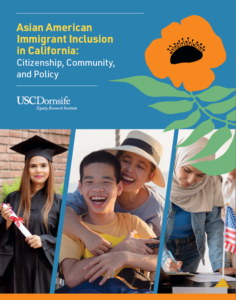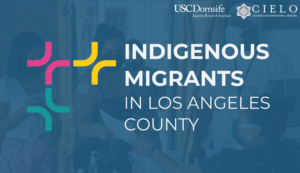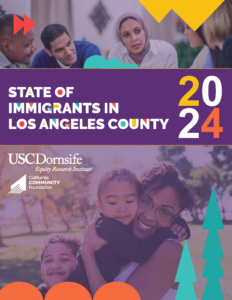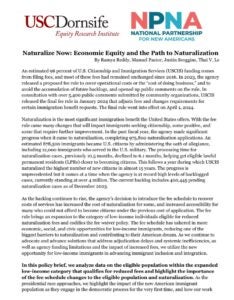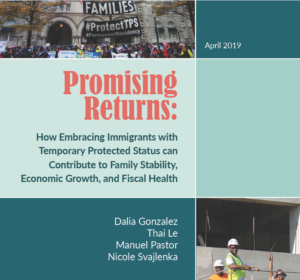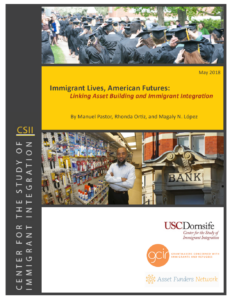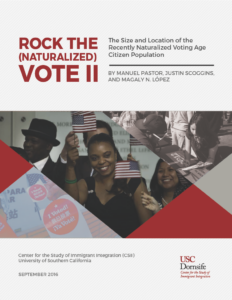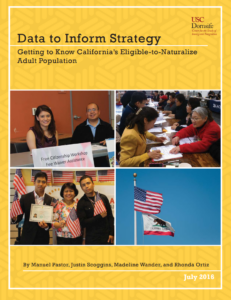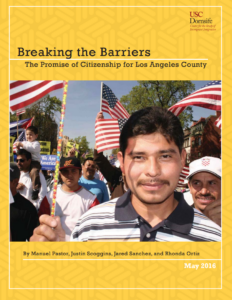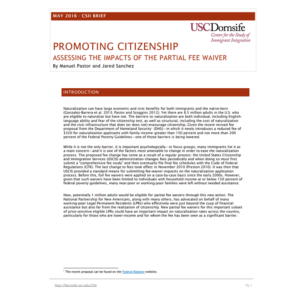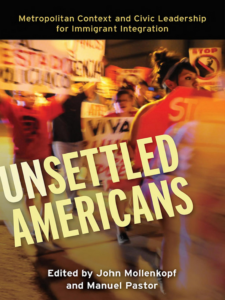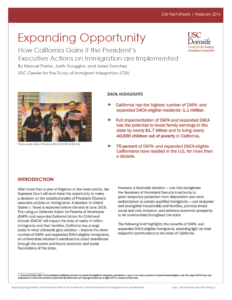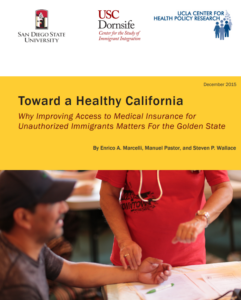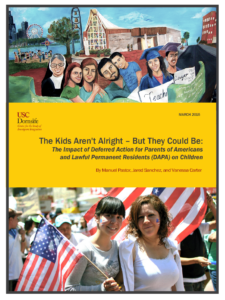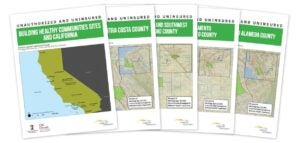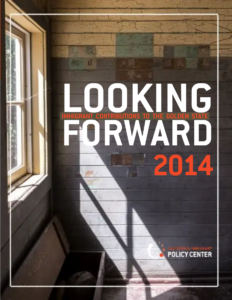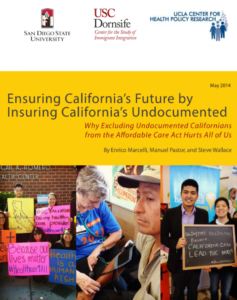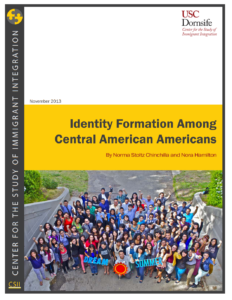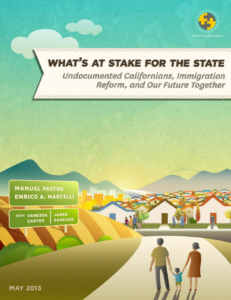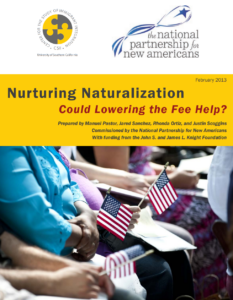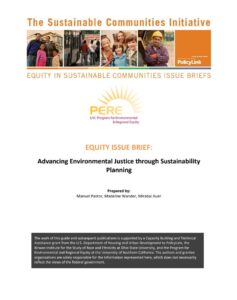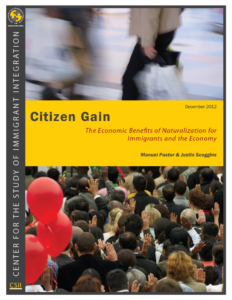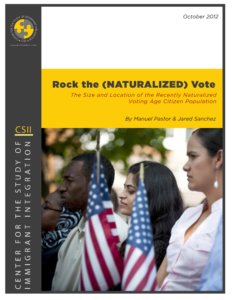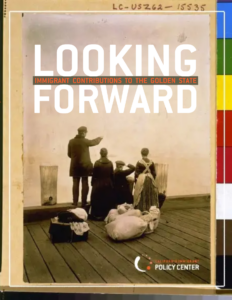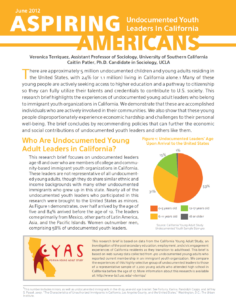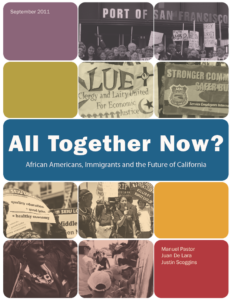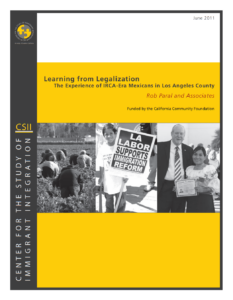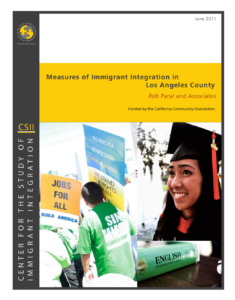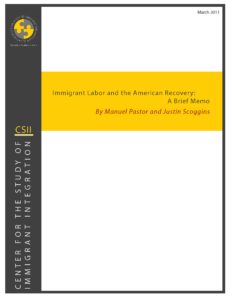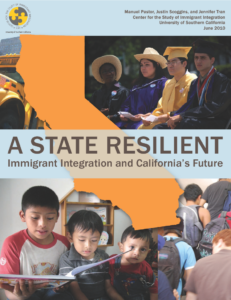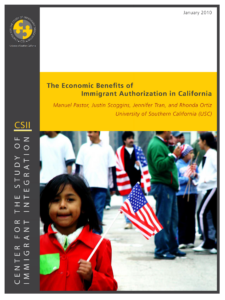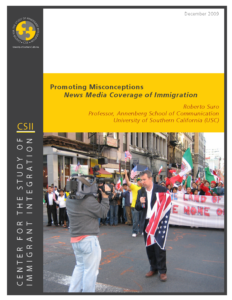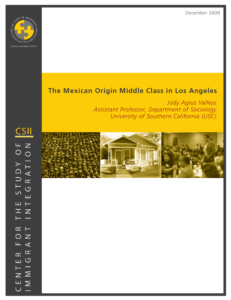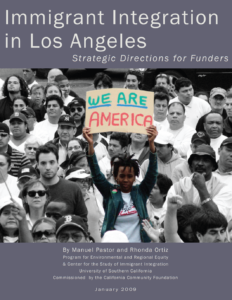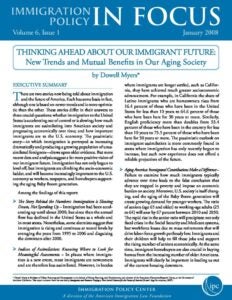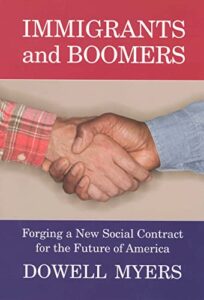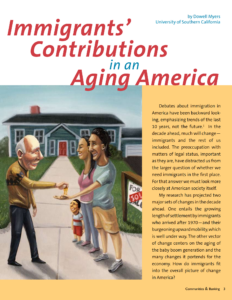Immigrant Inclusion & Racial Justice Reports
New publications
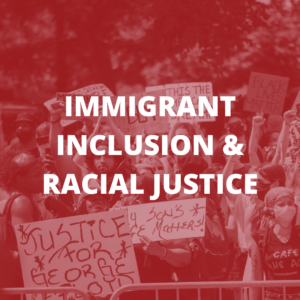
Recent reports (from 2020 to present)
Asian American Immigrant Inclusion in California: Citizenship, Community, and Policy
As the fastest-growing racial/ethnic group in the United States, largely contributed by increasing migration from Asia, Asian Americans are estimated to be the largest immigrant group in the country by 2055. The growing and increasingly diverse population contributes to an expanding interest and need to understand the nuanced experiences of Asian American immigrants, including their pathways to citizenship. Given the existing citizenship regime in the United States, naturalization is an essential process for immigrants and their social, economic, and political inclusion. The benefits of naturalization include the right to vote, improved potential to sponsor family members, expanded eligibility for social services, and access to jobs that require citizenship. Though the benefits of naturalizing are multifold for immigrants and their inclusion, improving access to naturalization also facilitates a more representative and democratic society. In this report, we take a mixed-methods approach to explore the drivers and barriers to naturalization. Our report dives into the nuanced pathways to citizenship for Asian American immigrants, using statistical modeling, surveys, and interviews to tease out the differences in experience due to ethnicity, migration history, socioeconomic status, gender, age, and more.
RepresentLA: Capturing the Program’s Direction and Impact Since its Inception
In July 2021, the Los Angeles County Board of Supervisors passed a motion that adopted the recommendations of the L.A. County Office of Immigrant Affairs (OIA) to create the RepresentLA program, building on its predecessor, the Los Angeles Justice Fund. Adopting the framework set forth in the report titled, Proposal for a Los Angeles Immigrant Community Legal Defense Program, RepresentLA is a merit-blind program that provides funds to organizations providing legal representation for removal defense and affirmative immigration relief, as well as social support services for clients and their families. The following are RepresentLA contractors and sub-contractors that have actively provided legal and social services to the immigrant community for the past few years:
- Al Otro Lado, Affirmative Asylum
- Coalition for Humane Immigrant Rights (CHIRLA), Affirmative and Removal Defense
- Central American Resource Center of Los Angeles (CARECEN-LA), Affirmative and Removal Defense
- Council on American-Islamic Relations-CA (CAIR), Removal Defense
- Esperanza Immigrant Rights Project (Esperanza), Affirmative Special Immigrant Juvenile Status (SIJS)
- Immigrant Defenders Law Center (ImmDef), Removal Defense
- Los Angeles LGBT Center, Removal Defense
- Public Counsel, Removal Defense
- Thai Community Development Center (Thai CDC), Affirmative Labor Trafficking
- TransLatin@ Coalition (TLC), Removal Defense
- University of Southern California Gould School of Law (USC), Removal Defense
This deliverable was prepared for the County administrator of the program, the County Office of Immigrant Affairs, to capture the program’s direction and impact since its inception. This deliverable includes demographic data on immigrant Angelenos; key takeaways on the importance of legal representation; an overview of the RepresentLA program; demographic and case activity data for RepresentLA clients since the program’s launch; and data from a wellness survey distributed to contractors and sub-contractors. The report concludes with key factors to consider for the program’s continuation.
Indigenous Migrants in Los Angeles County
Los Angeles County is home to many diverse Indigenous Migrant communities from what is now known as Mexico and Central America however data and reports on Latinx immigrant communities as a whole often obscures and effectively erases these communities in their analysis.
A newly released brief, “Indigenous Migrants in Los Angeles County” provides an opportunity to learn more about these diverse communities through the work of Comunidades Indigenas en Liderazgo (CIELO), an Indigenous women-led community-based organization, and preliminary research conducted by CIELO and the USC Equity Research Center. Community data gathering efforts such as survey data from CIELO’s outreach events offer a unique opportunity to better understand the diversity of Indigenous Migrant communities throughout Los Angeles County.
State of Immigrants in Los Angeles – 2024
Amidst a pivotal election year, the 5th Annual State of Immigrants in Los Angeles (SOILA) County report uplifts remarkable strides made across Los Angeles County to advance immigrant inclusion by highlighting the realities that immigrants experience in our county—through rigorously produced data analysis—and by providing local leadership with enough direction to make tangible and meaningful change.
Even as this political and economic landscape continues to exacerbate existing challenges and create new ones, there are still opportunities in L.A. County to build on previous policy wins and strengthen our commitment to the millions of immigrants that call this region home. In this crucial moment, we need to leverage the existing infrastructure—of funding, partnerships, programs, and resources—to continue our fight of improving the lives of immigrant Angelenos and prepare for the challenges ahead. In its 5th iteration, the goal of the State of Immigrants in Los Angeles (SOILA) County report remains the same: to highlight the realities that immigrants experience in our county—through rigorously produced data analysis—and to provide local leadership with enough direction to make tangible and meaningful change. In previous years, we accomplished the latter half of this goal through interviews of L.A. County immigrant-serving institutions and organizations that have helped us craft detailed recommendations for local leaders—elected officials, foundations, city and county departments, business entities, and more—to consider.
Naturalize Now: Economic Equity and the Path to Naturalization
The National Partnership for New Americans (NPNA) and USC Dornsife Equity Research Institute (ERI) released a new policy brief, “Naturalize Now: Economic Equity and the Path to Naturalization,”analyzing and discussing the impact of the new U.S. Citizenship and Immigration Services (USCIS) naturalization fee structure. The final USCIS fee rule, which adjusts application fees and changes requirements for certain immigration benefit requests, went into effect on April 1, 2024 and expands access to naturalization to many who could not afford to become citizens under the previous application costs.
Key findings include:
- Of the 8.6 million eligible-to-naturalize population across the United States, more than two in three (71%) now qualify for a reduced fee ($380) or full fee waiver ($0).
- Compared to the previous fee rule, there are approximately 1.8 million more eligible-to-naturalize people who qualify for a reduced naturalization fee.
State of Immigrants in Los Angeles – 2023
June 2023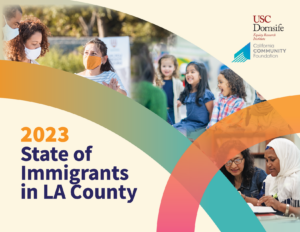
The State of Immigrants in L.A. County (SOILA) 2023 report captures the work of immigrant-serving institutions—alongside quantitative data on how immigrants are faring—and shares recommendations for further work directly from the field.
SOILA 2023 details how Los Angeles can continue to lead on immigrant inclusion with racial equity values at the forefront by exploring nine issue areas impacting immigrant communities. We offer recommendations to push for a new phase of immigrant inclusion that utilizes investments to their fullest capacity and pushes for more to ensure that immigrant Angelenos can achieve their potential; feel empowered to engage in civic life; and experience a sense of welcome in our region.
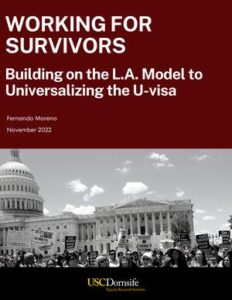 Working for Survivors: Building on the L.A. Model to Universalizing the U-visa
Working for Survivors: Building on the L.A. Model to Universalizing the U-visa
November 2022
The U-visa is a non-immigrant visa created by Congress in 2000 that is provided to non-citizens and their families who have been victims to violent and exploitative crimes, such as domestic violence, sexual assault, felonious assault, and other “qualifying crimes” outlined by the United States Citizenship and Immigration Services (USCIS). The visa allows recipients to apply for a work permit, apply for public benefits, and eventually a pathway to citizenship. Further, the U-visa is increasingly becoming an important avenue towards immigration relief, especially for disadvantaged and marginalized immigrants who are more exposed to violence in American society.
This report highlights the role that local advocacy infrastructure plays in developing progressive policies statewide, the role this infrastructure makes in shaping U-visa accessibility in the county today, and highlight how local bureaucratic openness to working on the U-visa issue cleared the way for Los Angeles becoming the U-visa capital of the country.
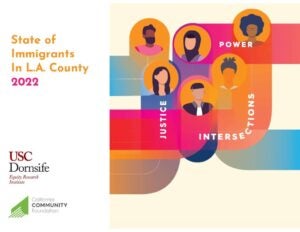 State of Immigrants in Los Angeles – 2022
State of Immigrants in Los Angeles – 2022
June 1, 2022
Immigrants are a central part of the Los Angeles community, landscape, and overall functioning of the county–over 1 in 3 Angelenos are immigrants or 3.6 million. Although “immigrant” is helpful in describing those born outside of the U.S., in this case, the immigrant experience is far from uniform as it is shaped by race, class, legal status, etc. In our third consecutive year of the State of Immigrants in Los Angeles County (SOILA) 2022 report, we highlight the standing of immigrants in L.A. as the effects of the pandemic continue to be felt, including in the context of major, system-altering changes stemming from the COVID-19 pandemic.
Our 2022 report continues to build on the previous two SOILA reports and attempts to shed light on pressing facets of immigrant life. Moreover, evolving from our prior focus on immigrant integration, and in better alignment with community organizers and immigrant communities, this year we use “immigrant inclusion” as our analytical lens. This approach emphasizes the role of immigrants in building power and creating their own life narratives and stresses the linkage between the barriers to full inclusion immigrants navigate and broader struggles for racial and economic justice.
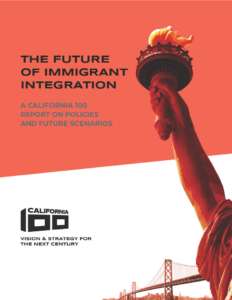 California 100: The Future of Immigrant Integration Policy and Scenario Report
California 100: The Future of Immigrant Integration Policy and Scenario Report
April 25, 2022
What would immigrant integration look like in California 100 years from now? What will future changes mean for current and future generations of Californians, and how can we make sure that California’s future in immigrant integration remains innovative, resilient, inclusive, sustainable, and equitable?
Thai V. Le (Turpanjian Postdoctoral Fellow in Civil Society and Social Change, USC Equity Research Institute) and Manuel Pastor (Director, USC ERI) led a research team in examining where California has been, where it’s at, and where it’s headed when it comes to possible immigrant integration scenarios and policy alternatives for the future. The research team conducted extensive primary and secondary research, and spoke with a wide array of experts in the public and private sectors to examine possible scenarios and policy options for future-focused action.
The Future of Immigrant Integration Policy and Scenario report by USC ERI is funded by the California 100 Initiative as one of the reports being released by the Initiative across 13 different policy domains for the future of California in 2022.
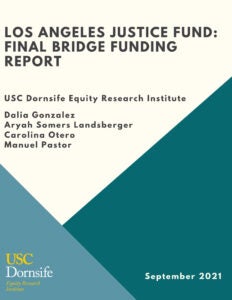 Los Angeles Justice Fund: Final Bridge Funding Report
Los Angeles Justice Fund: Final Bridge Funding Report
2021
By Aryah Somers Landsberger, Carolina Otero, Dalia Gonzalez, Manuel Pastor, and Rhonda Ortiz
Launched in 2017, the Los Angeles Justice Fund (LAJF), is a public-private partnership with the City and County of Los Angeles, the Weingart Foundation, and the California Community Foundation, created in response to the Trump administration’s anti-immigrant policies. The goal of this partnership is to provide free legal representation to immigrant Angelenos in deportation proceedings.
Our reports, prepared for the City, County, and philanthropy, were designed to provide data and narrative from LAJF’s pilot and bridge funding phases, broader context for understanding why legal representation is important, and key takeaways for the Fund’s continuation.
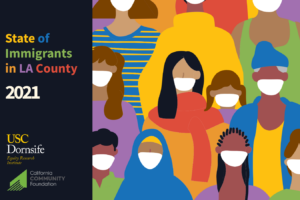 State of Immigrants in Los Angeles County – 2021
State of Immigrants in Los Angeles County – 2021
June 8, 2021
By the USC Equity Research Institute and the California Community Foundation
Immigrants are a vital and large part of L.A. County, and have played a critical role in helping L.A. weather through the COVID-19 pandemic. A large share of “essential” jobs in L.A. County are held by immigrant workers; however, immigrants are disproportionately affected by the consequences of this global pandemic. Immigrants, especially undocumented immigrants, disproportionately lack access to health insurance, are less likely to have a financial safety net, and are less digitally connected. The State of Immigrants in Los Angeles County (SOILA) 2021 builds on the framework from SOILA 2020 by making immigrant integration the focus while examining how the data is now colored by the various impacts of COVID-19.
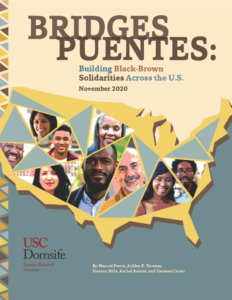 BRIDGES|PUENTES: Building Black-Brown Solidarities Across the U.S.
BRIDGES|PUENTES: Building Black-Brown Solidarities Across the U.S.
November 9, 2020
By Manuel Pastor, Ashley K. Thomas, Preston Mills, Rachel Rosner, and Vanessa Carter
Bridges|Puentes focuses on one part of our multiracial future: Black-Latino coalition building. As the largest non-white demographic block, this potent coalition can do much for racial justice by moving the needle on quality education, political enfranchisement, decent and well-paying jobs, affordable housing, healthy environments, and more. As such, it is frequently undermined. This research looks at that dynamic in four places: Jackson, Mississippi; Milwaukee, Wisconsin; Orlando, Florida; and Oakland, California – vastly different based on their regional specificities.
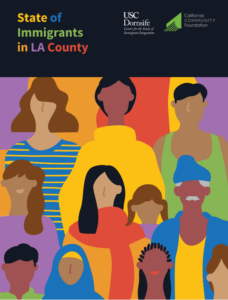 State of Immigrants in Los Angeles – 2020
State of Immigrants in Los Angeles – 2020
January 2020
By California Community Foundation and USC Center for the Study of Immigrant Integration (CSII)
Authors: Dalia Gonzalez, Sabrina Kim, Cynthia Moreno and Edward-Michael Muña
The State of Immigrants in Los Angeles (SOILA) report documents how immigrants are faring economically, if they are connected to and engaging in civic life, and how L.A. County creates a welcoming environment. It attempts to cover many if not all facets of immigrant life and provides a base for further inquiry, action, and forthcoming work for L.A. County immigrant-serving institutions.
Reports by the Center for the Study of Immigrant Integration - CSII (from 2008 to 2019)
From 2008 to 2019, ERI published immigrant integration under our previous name, the USC Center for the Study of Immigrant Integration (CSII). These publications are listed below in reverse chronological order.
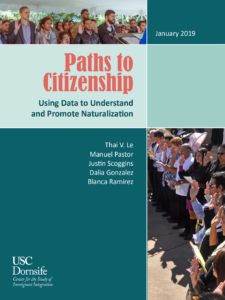 Paths to Citizenship: Using Data to Understand and Promote Naturalization
Paths to Citizenship: Using Data to Understand and Promote Naturalization
January 2019
By Thai V. Le, Manuel Pastor, Justin Scoggins, Dalia Gonzalez, and Blanca Ramirez
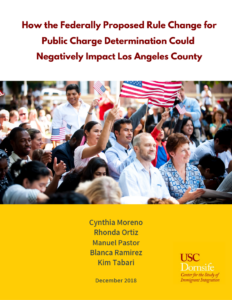 How the Federally Proposed Rule Change for Public Charge Determination Could Negatively Impact Los Angeles County
How the Federally Proposed Rule Change for Public Charge Determination Could Negatively Impact Los Angeles County
December 2018
By Cynthia Moreno, Rhonda Ortiz, Manuel Pastor, Blanca Ramirez, and Kim Tabari
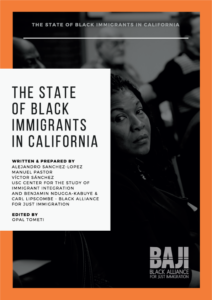 State of Black Immigrants in California
State of Black Immigrants in California
September 2018
By Alejandro Sanchez Lopez, Manuel Pastor and Victor Sanchez (USC CSII) and Benjamin Ndugga-Kabuya and Carl Lipscombe (the Black Alliance for Just Immigration), edited by Opal Tometi
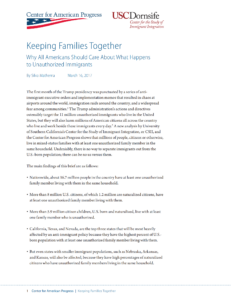 Keeping Families Together: research brief and interactive data map
Keeping Families Together: research brief and interactive data map
May 2017
By Center for American Progress and the USC Center for the Study of Immigrant Integration (CSII)
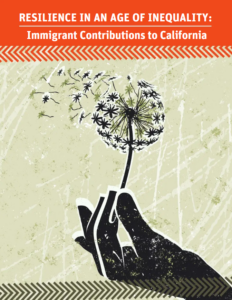 Resilience in an Age of Inequality: Immigrant Contributions to California
Resilience in an Age of Inequality: Immigrant Contributions to California
January 2017
By California Immigrant Policy Center and the USC Center for the Study of Immigrant Integration (CSII)
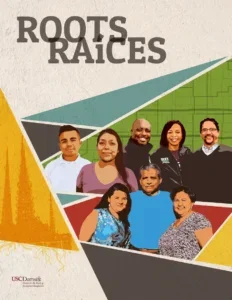 Roots | Raíces: Latino Engagement, Place Identities, and Shared Futures in South Los Angeles
Roots | Raíces: Latino Engagement, Place Identities, and Shared Futures in South Los Angeles
November 2016
By Manuel Pastor, Pierrette Hondagneu-Sotelo, Alejandro Sanchez-Lopez, Pamela Stephens, Vanessa Carter, and Walter Thompson-Hernandez
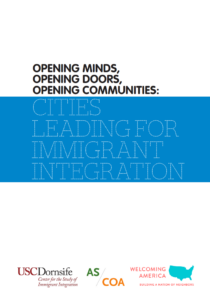 Opening Minds, Opening Doors, Opening Communities: Cities Leading for Immigrant Integration
Opening Minds, Opening Doors, Opening Communities: Cities Leading for Immigrant Integration
December 2015
By Center for American Progress and the USC Center for the Study of Immigrant Integration (CSII), AS/COA, and Welcoming America
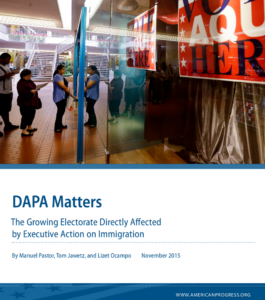 DAPA Matters: The Growing Electorate Directly Affected by Executive Action on Immigration
DAPA Matters: The Growing Electorate Directly Affected by Executive Action on Immigration
November 2015
By the USC Center for the Study of Immigrant Integration (CSII) and Center for American Progress
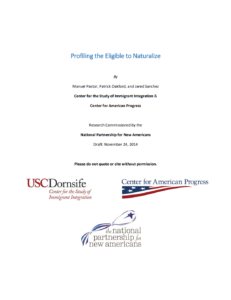 Profiling the Eligible to Naturalize
Profiling the Eligible to Naturalize
January 2015
By USC Center for the Study of Immigrant Integration (CSII), Center for American Progress, and the National Partnership for New Americans
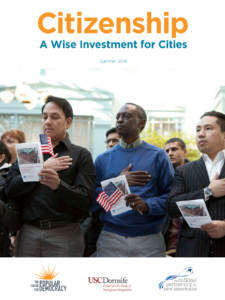 Citizenship: A Wise Investment for Cities
Citizenship: A Wise Investment for Cities
September 2014
By Center for Popular Democracy, USC Center for the Study of Immigrant Integration, and the National Partnership for New Americans
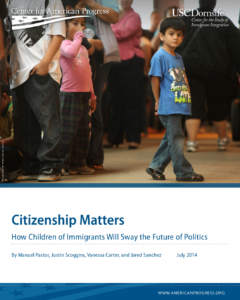 Citizenship Matters: How Children of Immigrants Will Sway the Future of Politics
Citizenship Matters: How Children of Immigrants Will Sway the Future of Politics
July 2014
By USC Center for the Study of Immigrant Integration and Center for American Progress
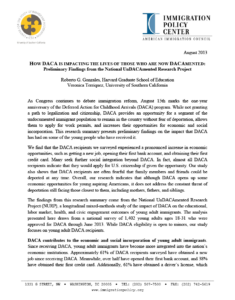 How DACA is Impacting the Lives of Those Who Are Now DACAmented
How DACA is Impacting the Lives of Those Who Are Now DACAmented
August 2013
By the Immigration Policy Center and the USC Center for the Study of Immigrant Integration
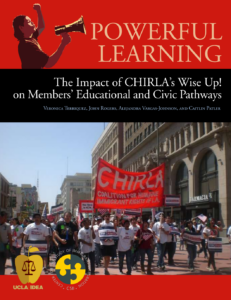 Powerful Learning: The Impact of CHIRLA’s Wise Up! on Members’ Educational and Civic Pathways
Powerful Learning: The Impact of CHIRLA’s Wise Up! on Members’ Educational and Civic Pathways
January 2013
By Veronica Terriquez, John Rogers, Alejandra Vargas-Johnson and Caitlin Patler
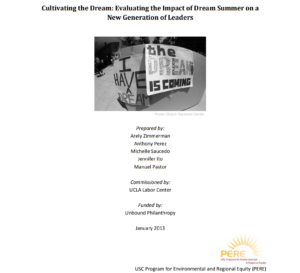 Cultivating the Dream: Evaluating the Impact of Dream Summer on a New Generation of Leaders
Cultivating the Dream: Evaluating the Impact of Dream Summer on a New Generation of Leaders
January 2013
Prepared by Arely Zimmerman, Anthony Perez, Michelle Saucedo, Jennifer Ito, and Manuel Pastor
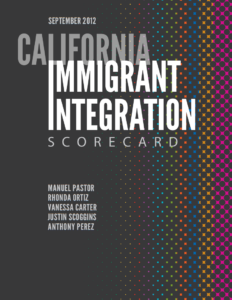 California Immigrant Integration Scorecard
California Immigrant Integration Scorecard
September 2012
By Manuel Pastor, Rhonda Ortiz, Vanessa Carter, Justin Scoggins, and Anthony Perez
